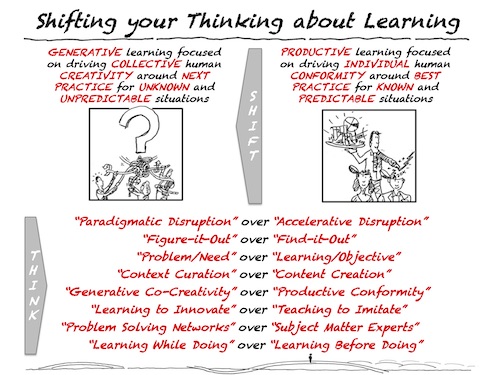
The COVID-19 disruption we are all enduring represents a pivotal moment in history where humanity’s future trajectory is being revectored. The decisions we make and the actions we take during this perplexing pandemic period are laying down the tracks upon which civilization will travel for decades to come.
Disruptions this big are rife with paradox. They happen slowly, then suddenly. They create a point of “punctuated equilibrium,” where long periods of stability are unexpectedly upended by seismic shocks. Their impact often is overestimated in the short term and underestimated in the long term. They create that eerie “liminal space” that exists between “what was” and “what’s next.” They are hard to figure out because they seem to contradict common sense and defy conventional wisdom.
Massive disruptions such as COVID-19 are particularly pernicious because they contain two different disruptive form factors. The first is accelerative, where many of the trends we have been observing are pulled forward faster. The second is paradigmatic, where the perturbations and reverberations of the disruption open up a portal to a future that is entirely different from what we might have previously imagined.
Figuring It Out
In times of disruption, human beings naturally gravitate toward familiarity. We tend to go with what we know. As a result, we often lean into what has worked in the past to solve a problem we encounter in the present. While this approach might prove useful in addressing the accelerative form of disruption, it is virtually useless in addressing the paradigmatic one.
In today’s increasingly paradoxical world, certainty is hard to come by. Each day surfaces new sets of questions to which we have no clear answers. In the post-COVID-19 era, we are no longer living in a world where all we have to do is “find out” the answer to established questions. Instead, we find ourselves having to “figure out” answers to previously unencountered ones.
To traverse the COVID-19 liminal space—moving from a pre-pandemic “find-it-out” world to a post-pandemic “figure-it-out” one—our learning approach must shift from productive to generative. Productive learning focuses on driving individual human conformity around best practices for known and predictable situations. Generative learning focuses on galvanizing collective human creativity around next practices for unknown and unpredictable situations.
We must tackle COVID-19’s paradigmatic disruptive form factor by curating generative learning contexts where people with diverse backgrounds and perspectives come together to figure out progression paths toward a better shared future.
A Global Step-Change in Learning
The primary paradox we face today is that we need a global step-change in learning at precisely the moment in time when we must shift from productive learning to generative learning. To successfully deliver on the worldwide upgrade in the knowledge, skills, and attitudes required to save both lives and livelihoods due to COVID-19, we must radically shift our thinking about learning itself. More specifically, we must:
- Think “Paradigmatic Disruption” over “Accelerative Disruption”
- Think “Figure It Out” over “Find It Out”
- Think “Problem/Need” over “Learning/Objective”
- Think “Context Curation” over “Content Creation”
- Think “Generative Co-Creativity” over “Productive Conformity”
- Think “Learning to Innovate” over “Teaching to Imitate”
- Think “Problem-Solving Networks” over “Subject Matter Experts”
- Think “Learning While Doing” over “Learning Before Doing”
Einstein famously quipped that “the significant problems we face today cannot be solved at the same level of thinking we were at when we created them.” By shifting our thinking from productive to generative learning, we can take the critical first step in figuring out the pernicious pandemic paradoxes the COVID-19 disruption has foisted upon us.
As Learning professionals, it is incumbent upon us to make sure this shift happens!
Tony O’Driscoll is a professor at Duke University’s Fuqua School of Business and a research fellow at Duke Corporate Education. He studies how organizations build the leadership system capabilities required to survive and thrive in an increasingly complex world.


